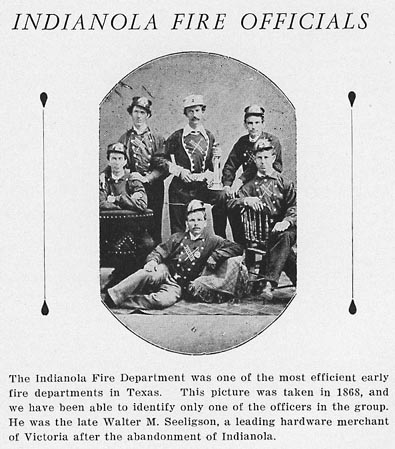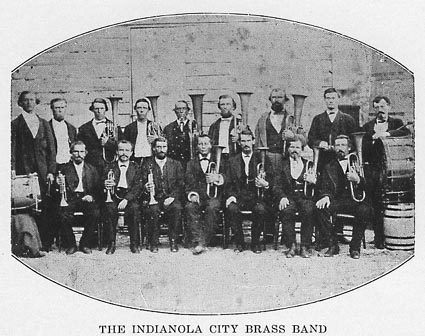

![]()
A Town Perfectly Situated
on the Bay...
Located on the middle Texas Coast, twelve miles from the Gulf of Mexico on the western shore of Matagorda Bay, the sleepy community of Indianola, stands today in stark contrast to the once vibrant town established here over 150 years ago. Sometimes referred to as the "Queen City of the West" or the "Mother of Western Texas", today's Indianola reveals little of its once glorious past. The effects of two hurricanes, eleven years apart, took its toll on the wooden buildings, homes and inhabitants. Sitting at sea level, it was bound do happen. But, prior to September 1875, the citizens had little reason to suspect a killer storm could arrive one day from the Gulf . Similar to the port of Galveston's inhabitants, they believed the conventional wisdom that they were situated at a special position on the coast, out of the reach of hurricanes!
The kind folks of Indianola had every reason to believe their labors would bring a hundred years of prosperity to them and their children and it would all be passed on to their grandchildren. Fathers founded lumber yards, butcher shops, blacksmith shops, law offices, fishing boats, bars and hotels. Sons one day would join their fathers and them later by their own sons. Life was good at Indianola in the 1800's.
This dream would end for many on September 16-17, 1875. A hurricane that was born near Africa left Indianola in shambles, washing 300 of the town's citizens and visitors to their deaths clinging to the debris of homes and businesses. The storm removed approximately three-quarters of the town and wrought heavy damage to the rest.
 While this was
warning enough for many of the survivors to move inland, a few with the
same determined spirit we see today after a hurricane strike, were determined
to return and rebuild their lives and homes at Indianola. But by August
of 1886, only around 200 habitants remained and over the days of August
18-19 the number of living was reduced and the town was wrecked once again
by a hurricane and an accompanying fire.
While this was
warning enough for many of the survivors to move inland, a few with the
same determined spirit we see today after a hurricane strike, were determined
to return and rebuild their lives and homes at Indianola. But by August
of 1886, only around 200 habitants remained and over the days of August
18-19 the number of living was reduced and the town was wrecked once again
by a hurricane and an accompanying fire.
The poet Jeff McClemore visited indianola in 1889. He walked the empty streets and witnessed the final destruction to the once prosperous and noble city that was so essential to the development of Texas in the middle 1800s. He was no doubt stunned by the destruction of the famous city and its abandonment to the elements and waters of Matagorda Bay.
He later mused:
So, Indianola, has it been with thee,
Thou once fair city by the moonlit sea!
Thy fame is ended and thy beauty fled -
Bleak memory calls thee from the silent dead.
Thy streets are nameless, and the sea-weeds grow
Along thy walks where life was wont to flow.
Forever dead! fore'er thy dream is o'er!
Thou liv'st alone on Memory's barren shore.
Less than fifty years earlier, Indianola's white crushed shell beach was alive with thousands of European immigrants as Indianola represented their door to the "land of milk and honey"; a new beginning for all that landed at its shores. McLemore would have thought of the great fanfare when Federal troops landed here on the eve of the Mexican War in 1846. And then again of more troops coming in 1849 to man frontier forts to protect Texas settlers from marauding bands of Indians and those same troops exiting Texas in anger, just prior to the Civil War in 1861.
No doubt he would have thought of the Indianola residents fighting cholera and yellow fever in hard times and the noisy swarms of mosquitos rising from the marsh on sweltering summer nights. He would have remembered the special citizens that composed the Indianola Band, Fire Brigade, and baseball team, the teachers, and the priests, nuns and clergy that taught its citizens about God . And one would remember forever a night ride by horse and buggy, down the beach to Old Town and back. A ride on an evening when a full moon rose over Matagorda Bay was never forgotten.
A town perfectly situated on the bay...
The sun that sets, yet sets to rise again,
Will smile the same, yet smile on thee
in vain;
While moonbeams dancing as the billows roar,
Will seem as bright, yet dance on thee no more.
(Jeff McLemore 1889 - "Indianola and
Other Poems")
Gary Ralston
Copyright 2006-010 - IndianolaTx.com - All rights reservered.
For information, contact gary@indianolatx.com